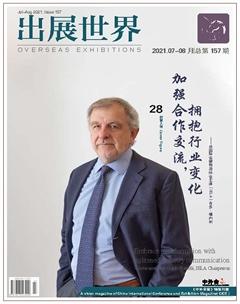Middle Eastern rebounds steadilyy
Cameron Roberts
Naji El Haddad, regional director MEA for UFI, told?the reporter?that although there has been plenty of talk of cancelled events, dropped revenues, redundancies, and other challenges, now is the time to speak about an industry rebounding. “Our determination to restart and thrive again, rethinking the future of our industry and its people and nthe reporter strategies to manage this and any future disruption, helped form the theme of the conference,” said El Haddad.
The one-day UFI?Middle East and Africa (MEA) Conference attracted 150 attendees from 10 countries on 26 May in Dubai. The event was the first post-pandemic events industry conference in the region, with 30 speakers attending on site for the global association of the exhibition industrys first in-person event after 15 months of digital events.
The programmes main talking points included: economic outlook, Dubai Expo, best practices and lessons learned, skills of the future, research and data analysis, as well as innovation and technological advancement to support face-to-face. El Haddad said the main goal of the conference had been to provide the audience with concrete, tangible solutions for them to take away and implement in their businesses.?Equally important was the forging of connections and partnerships among attendees to enable them to continue the conversation beyond the conference.?El Haddad added,“After seeing Dubai and the UAE reopening for large-scale events such as GITEX in December 2020, it was a sound place to host the UFI MEA Regional Conference.”?Conference host venue Dubai World Trade Centre delivered the highest standards of safety and hygiene, mostly based on UFIs Global Guidelines.
Swift response
El Haddad said most countries in the region had responded swiftly and efficiently to the pandemic, with all six Gulf states implementing economic stimulus packages (Oman $20bn, UAE$27bn) to support businesses and individuals across many sectors.?
“The governments in the Gulf region, UAE and Qatar in particular,” said El Haddad, “have shown resilience and agility in planning the restart of their economies, and very early identified business events as a key catalyst for economic rebound.”?
In 2019, a joint study between UFI and Oxford Economics illustrated the economic impact of exhibitions on the Middle East economies. The market size was put at 125,000 exhibiting companies and 3 milllion sqm of net space rented, with 6.25m visitors. That market produced $1.4bn in direct spending and $800m in direct GDP, as well as 14,000 jobs, according to the research.?
The situation is tough, however, in terms of reskilling and training, with most companies in the region having had to let go a number of their people. El Haddad noted the greatest risk has been the uncertainty. “If executives had known the crisis would last for a certain number of months, I am sure they could have managed it in a different way.?On a positive note, we are seeing quite a good number of companies slowly bringing back their‘former people or recruiting ones but, of course, not going back to their 2019 operational size.”
A sense of risk shall remain
“In terms of future skills needed in the rebounding phase, executives in the region will be looking at candidates combining both soft and technological skills,” said El Haddad, who believes the power of data has never been more important for the industry, as well as demand for professionals with the skills of analysing that data and transforming it into a product/service.? In terms of the mood music, El Haddad believes a sense of risk will remain, be it of a new wave of Covid, or cyber, climate, political, or any other risk. “The exhibition industry will need to learn from the current crisis to partially reinvent itself – and I am not talking here about virtual exhibitions; I strongly disbelieve those are a solution – to become more resilient, more relevant and more needed. The general mood in the region is a positive one; we have seen mega scale exhibitions taking place very successfully and safely in the UAE. Other countries in the region are less active at the moment but all are preparing the ground for a strong return soon.”
Easing of access restrictions
Although health and safety and testing issues vary from one country to another in the region, there is a general easing of ‘access restrictions. Dubai recently announced its hotels could go back to 100% occupancy and Abu Dhabi said it would not require visitors to quarantine from 1 July.?Some kind of electronic travel health passports are thought likely, however, El Haddad believes.?
“Creating a year-long dialogue with the communities that the events serve is important,”El Haddad noted, believing that technology companies that ‘claim to replace the physical exhibitions while providing the same experience are taking the wrong path and are overpromising.“They might have their own value proposition but cannot claim the same one as physical exhibitions.”?
Organisers had to adopt technologies that could first help them achieve their core mandate of connecting businesses and creating marketplaces- with the ability to monetise them in the future.

